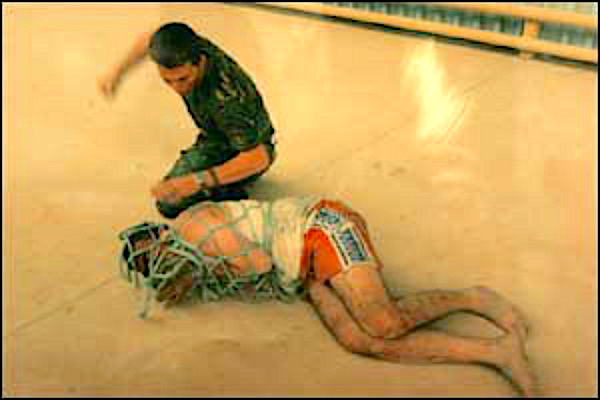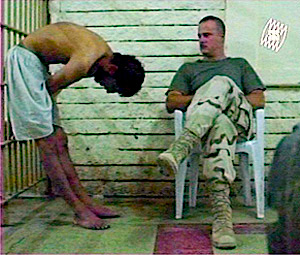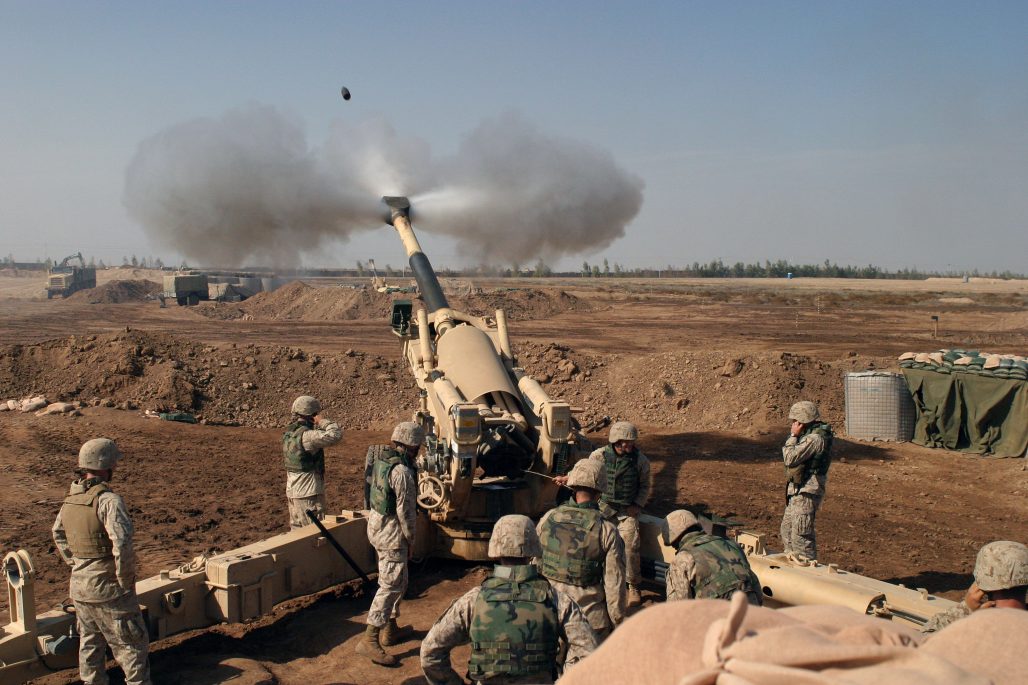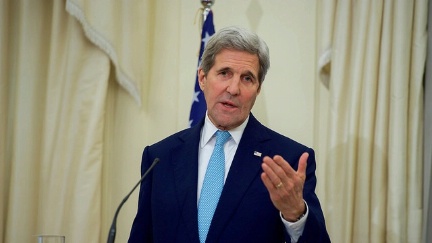We begin a new feature, looking back at articles published years ago on Consortium News on the current date. This article by Nat Parry, published on May 4, 2004, is about the madness of the 2003 invasion of Iraq.
The original version of this article can be found here.
By Nat Parry
 Marlon Brando’s Col. Kurtz character in “Apocalypse Now” applied crystal logic to the madness of the Vietnam War, concluding that what made sense was to descend into barbarism. The U.S. military hierarchy, judging Kurtz’s tactics to be “unsound,” ordered the colonel eliminated to keep at least a façade of civilization.
Marlon Brando’s Col. Kurtz character in “Apocalypse Now” applied crystal logic to the madness of the Vietnam War, concluding that what made sense was to descend into barbarism. The U.S. military hierarchy, judging Kurtz’s tactics to be “unsound,” ordered the colonel eliminated to keep at least a façade of civilization.
A reprise of that tragedy — a kind of “Apocalypse Again” — is now playing out in Iraq, with U.S. soldiers sent halfway around the globe to invade and occupy a country supposedly with the goal of protecting the world from violence and introducing democratic freedoms. As in Vietnam, there is a widening gap between the uplifting rhetoric and the ugly facts on the ground.
On April 30, for instance, with previous claims about Iraqi weapons of mass destruction and Saddam Hussein’s supposed links to al-Qaeda no longer tenable, George W. Bush touted a humanitarian justification for the invasion. “There are no longer torture chambers or rape rooms or mass graves in Iraq,” Bush told reporters as he retreated to this latest line of defense. But now even those minimal standards don’t appear to be true.
The year-long occupation of Iraq – like the war in Vietnam – has led some U.S. troops to engage in behavior that much of the world views as madness or war crimes.
The U.S. assault on Fallujah in April transformed a soccer field into a fresh mass grave for hundreds of Iraqis – many of them civilians – killed when U.S. forces bombarded the rebellious city with 500-pound bombs and raked its streets with cannon and machine-gun fire. There were so many dead that the soccer field became the only place to bury the bodies. Supposedly avenging Saddam Hussein’s old mass graves of the 1980s and 1990s, Bush’s policies have opened up new ones.
Rape Rooms
Even Bush’s oft-repeated assertion about closing Hussein’s torture chambers and rape rooms no longer can draw a sharp line of moral clarity.
As Bush spoke, worldwide press attention was focusing on evidence that U.S. guards had tortured and sexually abused Iraqi prisoners held at the Abu Ghraib prison, the same prison that Saddam Hussein’s henchmen used. U.S. guards photographed repulsive scenes of naked Iraqis forced into sexual acts and humiliating postures while a U.S. servicewoman gleefully gestured at their genitalia, according to pictures first shown on CBS News’s “60 Minutes II.”
Investigative journalist Seymour Hersh disclosed in The New Yorker‘s May 10 issue that a 53-page classified Army report concluded that the prison’s military police were urged on by intelligence officers seeking to break down the Iraqis before interrogation. The abuses, occurring from October to December 2003, included use of a chemical light or broomstick to sexually assault one Iraqi, the report said. Witnesses also told Army investigators that prisoners were beaten and threatened with rape, electrocution and dog attacks. At least one Iraqi died during interrogation.
“Numerous incidents of sadistic, blatant and wanton criminal abuses were inflicted on several detainees,” said the report written by Maj. Gen. Antonio M. Taguba. In other words, Iraq’s torture and rape rooms were open for business, only under new U.S. management. One victim who faced torture at Abu Ghraib under both Saddam Hussein’s regime and the U.S. occupation said the physical abuse from Hussein’s guards was preferable to the sexual humiliation employed by the Americans. Dhia al-Shweiri told the Associated Press that the Americans were trying “to break our pride.” [USA Today, May 3, 2004]
After the publication of the Abu Ghraib photos, Bush said he “shared a deep disgust that those prisoners were treated the way they were treated.” He added that “their treatment does not reflect the nature of the American people.” One would hope not.
But Bush’s protest was reminiscent of the senior officers in “Apocalypse Now” condemning Kurtz’s atrocities and extrajudicial killings, when Kurtz’s barbarism was only the logical extension of that war’s excessive violence. The generals created Kurtz and then had to disavow him.
 In a similar line of argument about Iraq, many people around the world are asking whether Bush should be held accountable for the policies that led to war crimes. Bush ordered the invasion in defiance of the United Nations, deemed his Iraqi enemies to be “evil,” and brought to bear massive firepower against both military and civilian targets.
In a similar line of argument about Iraq, many people around the world are asking whether Bush should be held accountable for the policies that led to war crimes. Bush ordered the invasion in defiance of the United Nations, deemed his Iraqi enemies to be “evil,” and brought to bear massive firepower against both military and civilian targets.
Restaurant Bombing
Possible war crimes attributable to Bush date back to the conflict’s earliest days. For one, Bush ordered the bombing of a Baghdad restaurant – a civilian target – because he thought Hussein might have been having dinner there. As it turned out, Hussein wasn’t among the clientele, but the attack killed 14 civilians, including seven children. One mother collapsed when rescue workers pulled the severed head of her daughter out of the rubble.
As the official who ordered the invasion, Bush also must bear ultimate responsibility for excesses blamed on U.S. troops who were put in an extraordinarily difficult and dangerous position of both conquering and then occupying a country with a different language and an alien culture. Bush’s invasion plan left U.S. forces stretched thin as they tried to establish order after toppling Hussein’s government in April 2003.
Jittery U.S. soldiers opened fire on demonstrations, inflicting civilian casualties and embittering the population. In Fallujah, some 17 Iraqis were gunned down in demonstrations after U.S. soldiers claimed they had been fired upon. The city has been a center of resistance ever since.
Over the past year, the insurgency has spread across Iraq, even uniting age-old religious enemies, Shiites and Sunnis, in the common cause of ending the U.S.-led occupation. More than 720 U.S. soldiers and thousands of Iraqis have died. By casting the war in Iraq as a clash between good and evil, Bush also arguably created conditions for justifying the humiliation of Iraqi prisoners who supposedly represented the “bad guys.”
Politically, the bloody occupation also has been a disaster for U.S. international standing, fuelling anti-American anger across the Middle East and around the globe. Spontaneous demonstrations have descended on U.S. embassies in many cities.
Even traditional U.S. backers are becoming unnerved at the image of a Christian zealot who thinks he’s guided by the Almighty inflicting death and destruction on an Islamic nation. Egyptian President Hosni Mubarak, considered one of the staunchest U.S. allies, cancelled a meeting with Bush and declared that current U.S. policies have created “hatred of Americans like never before in the region.”
“There was no hatred of Americans,” Mubarak said, but “after what has happened in Iraq, there is unprecedented hatred.” He said, “the despair and feeling of injustice are not going to be limited to our region alone. American and Israeli interests will not be safe, not only in our region but anywhere in the world.”
Angry Demonstration
I recently witnessed some of this hatred and anger on the streets of Copenhagen, Denmark, a marked contrast to the unprecedented outpouring of solidarity for Americans after the Sept. 11, 2001, terror attacks on New York and Washington. As in other cities around the world, residents of Copenhagen filled the sidewalks outside the U.S. Embassy with flowers and other displays of sympathy for the terror attacks.
On April 16, however, I came across a demonstration of thousands of people, overwhelmingly Arab and Muslim. I walked along, trying to get a feel for the tone. The banners and signs were typical enough, with demands for Denmark and the U.S. to leave Iraq and calls to “Stop Bush’s Massacre.” But there was a militancy and a strident anti-Americanism, unusual for traditionally mild-mannered Denmark.
A sound truck led the march, and when the leader called out a chant, the crowd answered in a deafening response. Chants included, “Jihad!” “Down, down, USA!” and “USA! You will pay!” Some demonstrators displayed an open animosity toward non-Arabs. One Arab man gestured to me with his head, as if to say, “Get out of here.”
The occupation of Iraq may be the most visible reason for the increased anger around the world, but Bush’s approach to the Israeli-Palestinian conflict is stirring possibly even deeper animosity. By endorsing Israeli Prime Minister Ariel Sharon’s plan to dismantle a few Jewish settlements in Gaza while keeping other parts of the occupied territories, Bush gave America’s stamp of approval to what many around the world see as clear violations of international law.
Until Bush’s endorsement of Sharon’s plan, the U.S. had maintained, along with the European Union and other leaders around the world, that Israeli settlements beyond the 1967 borders were illegal and presented “obstacles to peace.” But in a drastic change of course, Bush essentially legitimized those settlements, buying into Sharon’s view of a “Greater Israel.”
Beyond reversing 37 years of U.S. government policy towards Israel, Bush gutted his own “road map” to peace by eliminating the core principle that the final status of the territories will not be determined by unilateral action. Bush also has refused to join in denunciations of Israeli “targeted” killings of Palestinians, including Sheik Ahmed Yassin, the quadriplegic spiritual leader and founder of Hamas. EU foreign ministers said the killing of Yassin was “extrajudicial” and had “inflamed the situation” in the Middle East.
Bush said he found the Israeli attack “troubling” and called the Middle East a “troubled region,” while stressing that Sharon had the right to “defend” Israel against terrorism. The Bush administration also vetoed a Security Council resolution that would have condemned the Yassin assassination as a setback to the peace process. The U.S. explained that the resolution didn’t condemn Hamas by name, although it did condemn terrorism.
Soon after the Yassin assassination, Hamas said the U.S. and American leaders should be considered legitimate targets for revenge, reflecting the widely held perception that Israel only carried out the attack after receiving a green light from the Bush administration. Yassin’s successor as leader of Hamas, Abdel Aziz al-Rantissi, called Bush “an enemy of Muslims” and said Bush, together with Ariel Sharon, “declared war against Allah.” But, he added, “Allah declares war against America, Bush and Sharon.” [BBC, March 28, 2004]
Israel then assassinated al-Rantissi, an act also widely condemned by world leaders, including Bush’s closest ally, British Prime Minister Tony Blair. The EU’s External Affairs commissioner Chris Patten reiterated the EU’s position that “We believe that targeted assassinations are wrong, illegal and counterproductive.”
Again, the Bush administration declined to criticize the killing, saying Israel had a right to defend itself.
Policy Shift
The U.S. has always maintained a close strategic relationship with Israel and has frequently acted as an extension of the Israeli government in the U.N. Security Council. But under Bill Clinton and previous presidents, the U.S. worked as a broker seeking settlement to the long-running Palestinian-Israeli conflict. Bush changed that.
Ten days after his inauguration, at the first meeting of the National Security Council, Bush shifted to a more “hands-off” policy, according to Bush’s first Treasury Secretary Paul O’Neill whose insider account is presented in Ron Suskind’s The Price of Loyalty.
Bush is quoted as saying, “We’re going to correct the imbalances of the previous administration on the Mideast conflict. We’re going to tilt it back toward Israel. And we’re going to be consistent.” Bush’s analysis of the situation was that Clinton had “overreached,” causing negotiations to fall apart. “That’s why we’re in trouble,” Bush said.
Recalling a helicopter trip he had taken with Sharon over Palestinian refugee camps, Bush remarked, “Looked real bad down there. I don’t see much we can do over there at this point. I think it’s time to pull out of that situation.”
Secretary of State Colin Powell expressed strong misgivings, predicting that U.S. disengagement would unleash Sharon and lead to “dire consequences,” especially for the Palestinians. But Bush shrugged off the concerns, saying “Maybe that’s the best way to get things back in balance.”
Elaborating on this theory, Bush said, “Sometimes a show of strength by one side can really clarify things.”
So years of diplomatic efforts to resolve the Middle East conflict came to an end. Sharon launched some of the deadliest attacks ever seen in the Israeli-Palestinian conflict, and Palestinians countered with suicide bombings that killed Israeli civilians. The cycle of violence spiralled out of control.
Another early part of Bush’s Middle East strategy was the ouster of Iraqi dictator Saddam Hussein. O’Neill, who served on Bush’s National Security Council, said invading Iraq was on the new administration’s agenda from the start. Then, the Sept. 11 attacks gave Bush the political opening to lead the United States into Iraq in March 2003.
After a three-week war that drove Hussein’s government from power, however, U.S. forces struggled to bring order to Iraq and soon were facing a stubborn insurgency. As in Vietnam, the frustration of fighting a shadowy enemy that moves among the population has led to violent excesses, both in battlefield tactics and in interrogation of prisoners.
When Iraqi insurgents killed four American security contractors in Fallujah and a mob mutilated the bodies, Bush ordered Marines to “pacify” the city of 300,000 people. According to some accounts, more than 800 citizens of Fallujah have died in the assault and 60,000 fled as refugees. Now, Arabs are calling Fallujah the “new Jenin,” a reference to Israel’s deadly assault on the Jenin refugee camp in April 2002.
War Crimes?
In attacking Fallujah and in other counter-insurgency operations, the Bush administration again has resorted to measures that some critics argue amount to war crimes. These tactics include administering collective punishment against the civilian population in Fallujah, rounding up thousands of young Iraqi men on the flimsiest of suspicions and holding prisoners incommunicado without charges and subjecting some detainees to physical mistreatment.
During the siege of Fallujah, British human rights worker Jo Wilding said it was impossible to deliver food and medical aid to besieged civilians because of the threat of American snipers. She said everyone in Fallujah has lost at least one close friend or relative to the American onslaught.
Though U.S. forces insisted they were targeting only armed insurgents, international shock at the heavy firepower against a densely populated city contributed to the Marine decision to forego a full-scale assault on Fallujah. Instead, Marine commanders agreed to send in a former general from Hussein’s army to co-operate with city officials in restoring order.
There have been allegations of war crimes elsewhere in Iraq. In the city of Kut, American soldiers allegedly beat an Iraqi man to death because he refused to remove a picture of wanted Shiite Muslim leader Moqtada Sadr from his car. “After the man refused to remove Sadr’s picture from his car, the soldiers forced him out of the vehicle and started beating him with truncheons,” according to Agence France Press. He was taken to a hospital where he died from wounds sustained in the beating.
Meanwhile, Bush has continued to insist that the U.S. has eliminated a source of “tyranny and despair and anger” in the Middle East by overthrowing Saddam Hussein. In a press conference on April 13, Bush stressed that the war in Iraq is not only part of the struggle against “terrorism,” but is part of an epic battle between the “civilized world” and “Islamic militants,” “radicals,” and “fanatics.” It is a struggle in which “we are changing the world,” Bush said.
The world may indeed be changing, though not exactly in the way Bush suggests. Rather than becoming safer, it appears to be growing less safe. Instead of seeing the United States as a beacon of liberty, more and more people around the world are viewing Americans as arrogant bullies.
Presidential Race
In Europe and elsewhere, many people – from government leaders to common citizens – have become convinced that Bush is so inextricably tied to the failed policies in the Middle East that new leadership in Washington is a prerequisite for a solution. Sen. John Kerry, the presumptive Democratic nominee, is likely not exaggerating when he says that many world leaders are rooting for his victory.
What is less certain is whether even a Kerry victory would create the conditions to reverse Bush’s policies. On the campaign trail, Kerry has insisted that he would not abandon Iraq though he says he would reach out to the world community to share the responsibilities for bringing order. Kerry has even advocated committing 40,000 more troops, about a one-third increase in the 135,000 U.S. soldiers currently there.
As for the Iraq invasion, Kerry told Time that he “might have gone to war, but not the way the president did.” Kerry also said he is prepared to act unilaterally in defense of U.S. interests if a situation demands it. “But there is a way to do it that strengthens the hand of the United States,” Kerry said. “George Bush has weakened the hand of the United States.”
Some opponents of the Iraq War have criticized Kerry for not going further. They contend that his position constitutes “Bush-Lite,” although it is possible that Kerry is simply playing it safe, trying not to alienate swing voters who see a danger in a rapid U.S. withdrawal but also see a risk in Bush’s tendency for rash actions and “us-against-them” rhetoric.
At the very least, Kerry might know better than to paint the U.S. into corners with language about a clash between the “civilized world” and “fanatics.” He also might avoid quasi-religious language that casts the struggle as a “crusade” between “good” and “evil.”
The logic of Bush black-and-white world view eliminates the gray areas where political compromise is possible. The “bad guys” must be crushed. “Our side” must be victorious. Anyone not “with us” is “with the terrorists.” Drawing such lines in the sand can have the unintended consequence of pushing some people repulsed by U.S. actions to side with the terrorists when otherwise they would have stayed neutral.
Also, when U.S. soldiers see themselves as confronting “evil” and defending “good,” virtually any tactic becomes justified, whether blasting apart a rebellious city, torturing a suspected enemy or subjecting prisoners to sexual and physical humiliation to “soften them up” for interrogation.
Bush’s Iraq War is forcing Americans to relearn the hard lessons of Vietnam. Like Col. Kurtz in “Apocalyse Now,” U.S. forces are trapped between the unrealistic expectations of politicians back at headquarters and the harsh reality of a counter-insurgency war on the ground. Caught in that paradox, with no reasonable way to achieve the lofty goals, it cannot be surprising that one reaction from at least some soldiers in the field would be a descent into barbarity.
While punishing individual offenders is necessary in such cases, the larger question is: Who among the higher-ups also should be held accountable?
Nat Parry is co-author of Neck Deep: The Disastrous Presidency of George W. Bush.




Wow! What construction of article–madness and destruction parallels of Vietnam and Iraq wars, doublespeak/think:American military abuse of Iraqi people–bad; American people nature–good (paraphrase Bush quotes),there’s stormtroopers(bombs), snipers,pacifiers,,deceivers;there’s collusion,pacts according to the world of Bush–quite amazing that we are but cogs in that reality. And to lay this commentary against the backdrop of apocalypse then(1969?)) to apocalyse again(2004), I thank you Nat for that connection to time and space and the excellent presentation of events,actions,quotes,motivations,etc. Wow!
Thanks to Nat Parry for this revisitation of the corruption of the US government in that era, sickening as it is.
Now we know that it has only grown more subtle, glimpsed and illuminated via true journalists and whistleblowers.
Nations seldom learn from history except in defeat, but their moral and educated citizens do learn.
It is the invisible social and economic complexity of corruption that confounds us, even when we learn the issues.
We need to build new institutions to expose truth, and bring the knowledge of humanity to bear on its problems.
John Kerry, a man many thought to be a rather sensible, mild and moderate politician was RIGHT THERE ( in the middle of it all) when innocent human blood flowed like rain water after a storm.
Where ? South Vietnam. The Mekong Valley. 1968.
After that sojourn, Kerry was alleged to have said, : “American troops behaved like Genghis Khan. They raped, looted, burned, tortured, mutiliated and killed wantonly. ” Nothing has really changed over the years.
John Kerry has lost his soul. He has gone over to the dark side.
Germany (under Schroeder) and France (under Chirac) had the guts to refuse to participate in Washington’s gang rape of Iraq back in the early 00’s. Contrast that courage with the craven acquiescence of Merkel and the Sarkozy–Hollande–Macron succession to meet America’s demands and serve as partners in crime for all the lies, bullied coercion and outright murder that came later. Macron especially, with his on-stage mincing subservience to Big Daddy Trump, reminded me of the real reason they call ’em “French Surrender Monkeys,” and it wasn’t because Chirac compromised his dignity and morals. From now on, I’ll be calling my deep-fried potatoes “chips,” thank you very much.
This may be explained by Macron’s Socialist roots. In the context of French politics, the inspiring figure of the right is de Gaulle who insisted that France must have some independence befitting her grand tradition, and removed French military from NATO chain of command. By the law of contrasts, French Socialists were more pro-American that the Gaullists. That said, “We will be proud poodles of American empire” is not a catchy campaign slogan, so the trick is to be a “critical ally, with its own judgement”. Thus rather then having a poodle posture, walking gracefully on the side of the master/mistress, they are like a breed of dogs that alternate between falling behind and chasing ahead. At times, they are more cautious, at times they are chomping at the bit “Onto Libya! Onto Libya!”.
Please don’t do this again. I came very close to being physically ill revisiting this.
I know Jeff, it’s sickening. This is the face of evil. We want to look away, but we need to acknowledge the reality of this nightmare, in order to work to prevent it from destroying everything precious in our world.
Jeff-
I think we’ll all be barfing again shortly.
Mike and Skip, You’re both right, of course. I wrote letters at the time to my representatives asking how they could allow this stain on my country’s honor. And Skip, I’m just hoping I not puking from radiation sickness.
It’s easy to ignore war when you buy into the propaganda, and it’s even easier when you never see it up front. While reading this I could not help but think of the George M. Cohan’s WWI song ‘Over There’, and to how appropriate this song is for us Americans to comprehend it’s meaning.
Over There Lyrics
Johnnie, get your gun
Get your gun, get your gun
Take it on the run
On the run, on the run
Hear them calling, you and me
Every son of liberty
Hurry right away
No delay, go today
Make your daddy glad
To have had such a lad
Tell your sweetheart not to pine
To be proud her boy’s in line
Over there, over there
Send the word, send the word over there –
That the Yanks are coming
The Yanks are coming
The drums rum-tumming
Everywhere
So prepare, say a prayer
Send the word, send the word to beware
We’ll be over, we’re coming over
And we won’t come back till it’s over
Over there
Johnnie, get your gun
Get your gun, get your gun
Johnnie show the Hun
Who’s a son of a gun
Hoist the flag and let her fly
Yankee Doodle do or die
Pack your little kit
Show your grit, do your bit
Yankee to the ranks
From the towns and the tanks
Make your mother proud of you
And the old Red, White and Blue
Over there, over there
Send the word, send the word over there –
That the Yanks are coming
The Yanks are coming
The drums rum-tumming
Everywhere
So prepare, say a prayer
Send the word, send the word to beware
We’ll be over, we’re coming over
And we won’t come back till it’s over
over there
As much fun as that song can be with it’s joyful upbeat tempo, and spiraling patriotic lyrics, we should all remember we are talking about killing people over there. I posted the lyrics of ‘Over There’ because as innocent as the song sounds, I feel we American’s are ignoring to take these lyrics to the next level, and that level is death on a huge scale. You all may recognize this foreign death list as ‘Collateral Damage’.
While we Americans enjoy a peaceful world to thrive in, we should all pay more attention to what our country is doing in far off places. We assume, or like to assume, that our government is doing the right thing. This is where everyone loses, and that is where we assume our government is doing the right thing.
On the subject of torture I always need to mention Hanns Schraff and Sherwood Ford Moran. Both of these men, one an American, another a German under Hitler’s Nazi regime, wrote the book on interrogation as to how it’s done right. Guess what kindness replaces the torture rack.
Here is a little something on Hanns Schraff;
https://www.warhistoryonline.com/world-war-i/this-red-zone-in-france-is-so-dangerous-100-years-after-wwi-it-is-still-a-no-go-area-x-2.html
Thanks Joe. Good thoughts to ponder.
Yes, it is that joyful conformity to the group song, narrative, and expectation that leads us into moral wrong.
Neither we the people nor Congress nor our administrations have the desire for truth and justice to make policy.
Our elections and mass media, gradually seized by money power, have morally corrupted politics and the nation.
The worst rise to power in business in our unregulated economy, and buy the political and moral leaders.
Only when we reform our institutions can the morally educated and experienced join in the songs of patriotism.
Thanks to Nat Parry for this revisitation of the astounding corruption of the US government in that era, sickening as it is in all ways.
Now we know that it has only grown more subtle, glimpsed and illuminated via true journalists and whistleblowers.
Nations seldom learn from history except in defeat, but their moral and educated citizens do learn.
It is the invisible social and economic complexity of the corruption that confounds us, even when we read all we can of the issues.
We need to build new parties and institutions to expose the truth, and bring the knowledge of humanity to bear on its problems.
Our glorious and exceptional USA in action. Those who refuse to see this are liars, cowards, and secret sadists. I have no respect for those who look away from our atrocities, or worse – justify them. 5,000 Iraqi children dying: “was worth it” (Madeleine Albright)
Actually, it was 500,000 Iraqi children dying by our refusal to allow food and medicine in to them. Albright, a neoliberal flunky of the Clintons, thought it was well worth it. If the powers that be, including the Bushes, the Clintons, the Obamas and all their ilk of oligarchy and authoritarianism (including Wall Street and our corporate overlords) think that democracy is done, let them say so. At least stop lying about the reality of empire. Let’s declare ourselves an emperor that meets their expressed requirements. Then let’s put the heads of those leaders on pikes, and begin again with whatever will be next.
Had the USA begun it’s other War Crimes of destroying civilian infrastructure, electric generating stations, and bridges? No electric, no refrigeration of vaccines etc., no sewerage treatment, thus cholera epidemic.